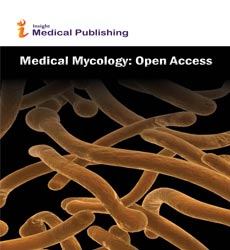Abstract
Biosynthesis and regulating mechanisms of patulin in Fungi
Statement of the Problem: Contamination of food and feed by fungal secondary metabolites known as mycotoxins is a global health issue. Patulin is one of important mycotoxins, and produced by several species belonging to Penicillium, Aspergillus, Paecilomyces, Byssochlamys. Among them, Penicillium expansum infects a wide range of fruits and vegetables, and is the main producer of patulin. Long-term exposure to patulin may cause serious health issues in humans, because patulin can induce immunological, neurological and gastrointestinal diseases. Level of patulin in food has been limited in many countries worldwide. However, the molecular mechanisms of biosynthesis and regulation of patulin are still unclear. Here, we identified the gene cluster of patulin in P. expansum, and characterized functions of patulin genes. Methodology & Theoretical Orientation: Whole genome sequencing was performed for patulin producer P. expansum and non-patulin producer Penicillium italicum. Bioinformatic analysis was used to identify patulin gene cluster. Knockout analysis and subcellular localization were used to characterize gene function. Findings: Whole genome sequences of P. expansum (33.52 Mb) and P. italicum (28.99 Mb) were obtained. A total of 71 backbone genes and 55 gene clusters related to secondary metabolism were predicted in P. expansum. Further, we identified a cluster of 15 genes responsible for the biosynthesis of patulin. Patulin gene clusters within more than 10 P. expansum related fungal species were compared and gene loss in some non-patulin producing species was identified. The importance of all the genes in patulin cluster is ascertained by gene knockout analysis. Deletion of the majority of genes completely blocked patulin production. Among them, PePatL may act as a pathway specific transcription factor, and play essential role in patulin biosynthesis. Moreover, LaeA, a global regulator, was also involved in the regulation of patulin regulation. In addition, patulin production did not contribute to the pathogenicity of P. expansum. Conclusion & Significance: Our findings indicate previously unknown roles of genes in the patulin cluster and cast insight into the molecular mechanism in biosynthesis and regulation of this important mycotoxin
Author(s):
Shiping Tian
Abstract | PDF
Share this

Google scholar citation report
Citations : 164
Medical Mycology: Open Access received 164 citations as per google scholar report
Abstracted/Indexed in
- Google Scholar
- China National Knowledge Infrastructure (CNKI)
- Directory of Research Journal Indexing (DRJI)
- WorldCat
- Publons
- Geneva Foundation for Medical Education and Research
- Secret Search Engine Labs
Open Access Journals
- Aquaculture & Veterinary Science
- Chemistry & Chemical Sciences
- Clinical Sciences
- Engineering
- General Science
- Genetics & Molecular Biology
- Health Care & Nursing
- Immunology & Microbiology
- Materials Science
- Mathematics & Physics
- Medical Sciences
- Neurology & Psychiatry
- Oncology & Cancer Science
- Pharmaceutical Sciences
